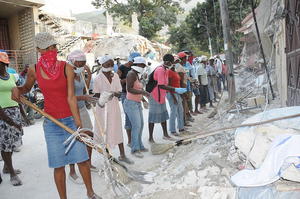Over 30 years of anarchist writing from Ireland listed under hundreds of topics
A Year Later in Haiti
 One year after the devastating earthquake that struck Haiti, the conditions endured by the ordinary people there are as bad, or worse, than they were before the earthquake. Of the billions of dollars promised by governments around the world to rebuild the devastated country only a fraction has reached the people of Haiti.
One year after the devastating earthquake that struck Haiti, the conditions endured by the ordinary people there are as bad, or worse, than they were before the earthquake. Of the billions of dollars promised by governments around the world to rebuild the devastated country only a fraction has reached the people of Haiti.
What passes for shelter for many thousands of ordinary Haitians consists of rubbish bags or tarpaulins supported by sticks. Without any major effort to remove rubble and bodies and to supply the population with basic necessities and medicine, the problems of disease and violence have been magnified. The call coming from many affected by the earthquake is that the government should be organising the decentralisation of the population away from the cities and onto the farmlands where they can grow their own food.
This strategy to escape the spread of disease would unfortunately be hampered by the already desperate situation of Haiti’s farmers who struggle to survive under the current economic structure which prevents them from becoming self supporting. Local farmers cannot compete with subsidised foreign imports of basic foodstuffs like rice. Instead they must grow cash crops for international markets and then use the money to buy foreign products. There is no international commitment to a stable indigenous agricultural system in Haiti. Instead there is a commitment to keeping the market stable and that depends upon keeping most Haitians poor.
In the cities, surviving in the aftermath of the earthquake and without any help from the state, the people of Haiti did not begin a rampage of looting as some news sources would have us believe. Instead, understanding that there would be no help from the government or the police, they organised themselves knowing that they would have to save each other. The arrival of foreign troops was and is portrayed as "restoring order". This is true to the extent that the "order" they are restoring is the pre-earthquake economic and social order. These foreign forces prevent the Haitian people rising up and taking their rights.
To a remarkable degree the ordinary people of Haiti are politically and economically conscious. This is because they live and die every day by the decisions made by the international markets and powerful foreign policy makers. One report tells of a most likely illiterate woman selling fruit on the street having a thorough understanding of world markets. Domestic and foreign forces collude in keeping this disenfranchised and desperate population under control and producing wealth for the few.
For those of us fortunate enough to live in conditions of comparatively great material and social comfort, the level of solidarity and political understanding displayed by the Haitian people under the most trying of circumstances should be looked upon as an inspiration. If the Irish people can develop a social strength and a political and economic awareness similar to the Haitians then we will be well on our way to sending the ruling elites in our own country running for cover.
WORDS: Brian F.

